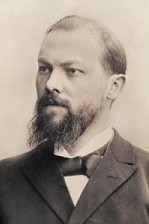Gustav Adolf Deissmann facts for kids
Quick facts for kids
Gustav Adolf Deissmann
|
|
|---|---|
 |
|
| Born | 7 November 1866 Langenscheid
|
| Died | 5 April 1937 (aged 70) Wünsdorf
|
| Nationality | German |
| Other names | Deißmann |
| Occupation | theologian |
| Known for | work on the Greek language used in the New Testament |
| Scientific career | |
| Institutions | University of Heidelberg, University of Berlin |
Gustav Adolf Deissmann (born November 7, 1866, died April 5, 1937) was an important German scholar. He studied the Greek language used in the New Testament part of the Bible. He showed that this Greek was not a special "Bible language." Instead, it was koine, which means the common Greek spoken by many people in the ancient world.
Contents
Life and Work
A Scholar of Greek
Gustav Adolf Deissmann became a professor of theology. He taught at the Ruprecht Karl University of Heidelberg from 1897 to 1908. After that, he moved to the Friedrich Wilhelms University of Berlin, where he taught from 1908 to 1935. His work helped people understand the Bible better.
He was recognized for his efforts many times. He was nominated twice for the Nobel Peace Prize. He also received eight honorary doctorates from six different countries. This shows how respected he was around the world.
The Eranos Circle
In 1904, Deissmann helped start a group called the Eranos circle in Heidelberg. He founded it with another scholar, Albrecht Dieterich. This group was a place for smart people to meet and share ideas. Famous thinkers like Max Weber were part of this circle. They discussed many important topics together.
Working for Peace
While in Berlin, Deissmann's focus began to change. He became very interested in the ecumenical movement. This movement tries to bring different Christian churches closer together. He also worked on church reform, which means making churches better.
Most importantly, he cared about Völkerverständigung. This big German word means "mutual understanding between nations and cultures." It's about helping countries and people understand each other to promote peace.
During World War I (1914-1918), Deissmann wrote a regular newsletter. It was called the Evangelischer Wochenbrief (Protestant Weekly Letter). He wrote it from 1914 to 1922. The English version was called Protestant Weekly Letters. He wrote these letters mainly for important Christians in Germany and America. His goal was to create a place where people could talk about peace and understanding between nations during the war.
Saving Ancient Ephesus
In 1925, Deissmann learned that the ancient city of Ephesus was falling apart. Ephesus is a very important historical place. Some parts of it had been dug up by archaeologists before World War I.
Deissmann worked hard by himself for several years. He tried to get people in Germany and other countries to care about Ephesus. He managed to find money to restart the archaeological digs in 1926. This important work continued every year until 1929.
Later Life
Gustav Adolf Deissmann passed away on April 5, 1937. He died in Wünsdorf, a town near Berlin. He is buried in the local cemetery there.
See also
 | Jackie Robinson |
 | Jack Johnson |
 | Althea Gibson |
 | Arthur Ashe |
 | Muhammad Ali |

